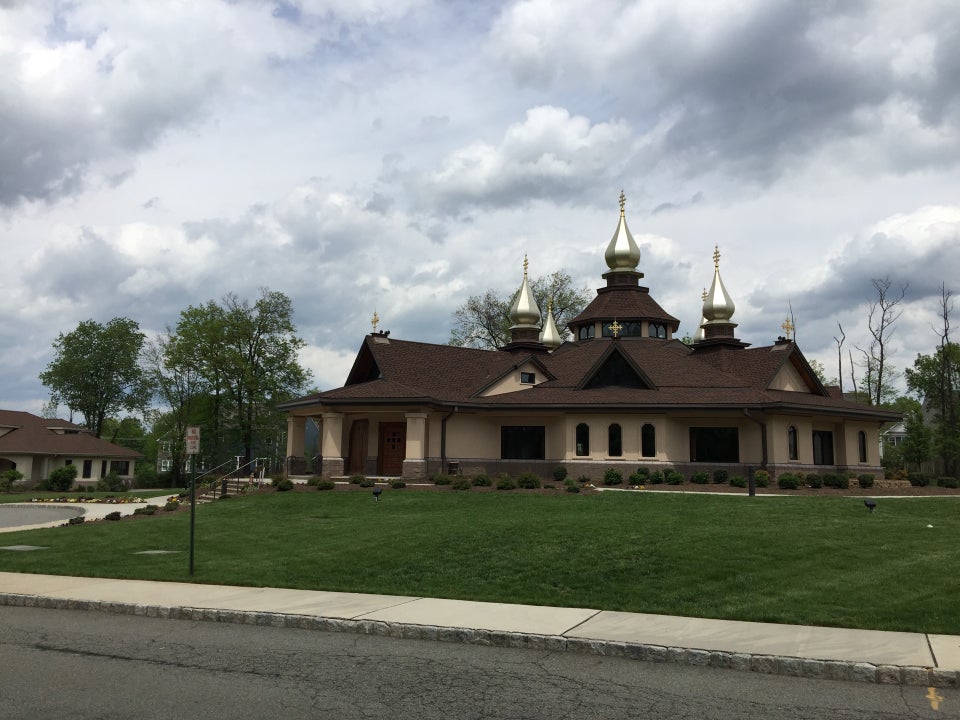I'm writing this one for friends and interested Poles and
Ukrainians.
It concerns a chance meeting with a Ukrainian American man, middle
aged, tall, attractive, as so many eastern Europeans are. But this is not about
attraction; it's about preconceptions, good intentions, and disappointments.
Roman (that's his name) was the only visible staff person at
a public environmental center/garden in Summit, NJ. He stood outside the visitor's center in his
logoed shirt, and apologetically explained to my husband and me, arriving there
with Bennett's almost-90 mom, that there were no paved paths on the gardens' 33
acres. There were lots of steps, and
only gravel on the walkways. Not great
for wheelchairs or walkers, or even sturdy upper 80-somethings.
Not his fault; we should have found that out before coming.
He kindly suggested we might drive a few hundred feet further, to another
parking lot that led to trails that were at least more level, if just as
gravelly. Bennett nonetheless set off on
the trail we were standing near, pushing his mom in the wheelchair and plowing through
gravel, beating up the wheels.
I stayed behind because I love accents, and this man had one
that sounded familiar; certainly Slavic.
I told him I was trying to remember who I knew personally with his
accent, and he told me he was from Ukraine. I told him, like I tell everyone from Ukraine,
that my father's mother came from a tiny town near Vinnitsa: Kopaigorod. (I said "Venitsiya," which was
wrong and meant Venice to him, but he corrected me.) He said, "do you know
what Kopaigorod means?"
"Market town?" I
replied, knowing "Kupitz" in Russian means "to buy." No. "Kopai" in Ukrainian means
"digging." What would a
digging town be, I wondered? One with mines?
 |
| Whippany Ukrainian Church, St. John the Baptist |
He told me he was from Lviv, a town two hours east from where my other grandmother came from, in Poland. I told him that she had called it by its German name, Lemberg, and that it had been considered the nearest big city back then, not across a national border. Whereupon we had this quick interesting conversation about how his grandfather used to say he'd lived in five countries without leaving his house: under Austro Hungarians, Germans, Russians, Poles, Ukrainians.
In between our back and forth, other visitors came and asked
Roman to identify some plants outside the center. He explained that they were elephant ears; he
also knew their Latin name. He showed
them which of the plants growing nearby could be wintered indoors.
I had mentioned earlier that I came from Eastern European
Jews. (The Jewish part may have been immediately obvious, as I happened to be
wearing an old t-shirt from U of MD's Hillel with "Maryland" written
on it in Hebrew.) We talked about history, Rumania, Moldova, more recent Ukrainian
protests. He told me how disappointed Ukrainians
were in their pro-Soviet and in their present leaders, and how widespread
corruption was. Also that in the eastern
part, many people were pretty pro-Russian. He wasn't exactly promoting it for
my Roots Tour, Part II.
I mentioned my father's father's town, Shargorod. That one he had heard of. I related that the Jews of Shargorod actually
survived the war in much greater numbers than other parts of Ukraine; that they
had been sheltered by Rumanians, and that a book, The Red Shtetl, described
this anomalous town.
He couIdn't or didn't
mention any Jews he might have known in Ukraine, but he did know that there
were some towns, like Belz and Uman, where today's Jews came to visit, as they
had once been homes to "Jewish saints." I explained a tiny bit about
Hasidim and their luminaries, and how Belz was the subject of a popular Jewish
song. He found that interesting. I see now that Belz is just north of Lviv.
So where did my disappointment come from? It came from seeing an apparently educated and
presumably enlightened man, student of history, maybe professional
horticulturalist or botanist, morphing before my eyes, from the fellow world
observer/humanist I assumed he was, into a fundamentalist whose literal truths
came from his bible.
While he hadn't been looking for this conversation and I had
restarted it at least once, at some point Roman felt comfortable enough with me
to say he knew that Jews lived all over the world. He read the Bible a lot, he
said; he knew that Jews were chosen by God.
And that Jews had not listened to their God, and so were dispersed
around the world as punishment. And that
some day we Jews would all be reunited in Jerusalem.
I don't think he meant it unkindly. He may even have thought he was being
ecumenical. And it's Jerusalem he's
consigning us to, not hell. Progress. But holy crap, here was a man who'd left
his inhospitable native land for a better life, just as my grandparents had
left theirs two generations earlier. Why
did he think it was my whole family's destiny to leave for Jerusalem? Did he assume that's what we wanted? What all
Jews wanted for all Jews? Did he think it was his fate to return to Lviv, or
was it to live out his life in an ultimately Judenrein U.S.?
Here, I suppose, was a Ukrainian church education making
this man of science think fantastical, illogical and if you think about it, unnerving
things. No less disturbing a force than
the church in staunchly Catholic Poland. "I think some of us might resist being
reunited," was all I said, even though Israel is more important to me than
it is to many other Jews.
We stowed the wheelchair and proceeded to the other parking
lot. I waved to him later, when we passed by on the way home.
No comments:
Post a Comment